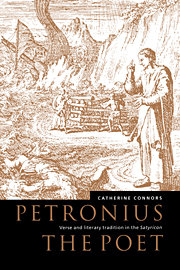Book contents
- Frontmatter
- Contents
- Prefatory note
- Acknowledgements
- List of abbreviations
- Introduction
- 1 Refashioning the epic past
- 2 In the frame: context and continuity in the short poems
- 3 Troy retaken: repetition and re-enactment in the Troiae Halosis
- 4 The Bellum Civile
- Epilogue
- Bibliography
- Index of passages discussed
- Index of subjects
Epilogue
Published online by Cambridge University Press: 28 October 2009
- Frontmatter
- Contents
- Prefatory note
- Acknowledgements
- List of abbreviations
- Introduction
- 1 Refashioning the epic past
- 2 In the frame: context and continuity in the short poems
- 3 Troy retaken: repetition and re-enactment in the Troiae Halosis
- 4 The Bellum Civile
- Epilogue
- Bibliography
- Index of passages discussed
- Index of subjects
Summary
Like all books of criticism, this one fragments and reassembles its object of study. Prying Petronius' novel apart to see how verse fits into prose may leave it in more fragments than many people would like.
I began by asking why Petronius spends time being a poet while writing his novel. At the most basic level, ancient prose fiction has generic boundaries loose enough to include verse; a professional poet is a useful character; and the ability to produce competent verse defines Encolpius (and of course Petronius) as someone who has had an education. Yet to choose a genre, even one as loosely defined as prose fiction, is to reject all the others. The inclusion of verse insistently keeps performing this rejection: by producing verse within his fictional prose, Petronius sets his novel in a self-consciously agonistic relationship with the literary genres which he has repudiated. The Satyricon turns epic's national heroism into private obscenities, expands satiric characters and epigrammatic situations to lengthy episodes, and stages mimes in the privacy of its own pages. How might the Satyricon have measured up against such Greek novels as could have been in circulation? It would parody an idealizing, romantic plot, and might have overturned the idealizing novels' affirmation of the social order in the marriage and homecoming of the hero and heroine. If, as is likely, Greek criminalsatiric fiction was already a going concern, the Satyricon might differ mainly in not making the Roman empire invisible: racy Greek fiction would not have consumed, as the Satyricon did, Roman satire's pungent Italian inventions, nor would it have parodically imitated and debased the imperial monuments of Roman epic.
- Type
- Chapter
- Information
- Petronius the PoetVerse and Literary Tradition in the Satyricon, pp. 147 - 148Publisher: Cambridge University PressPrint publication year: 1998



